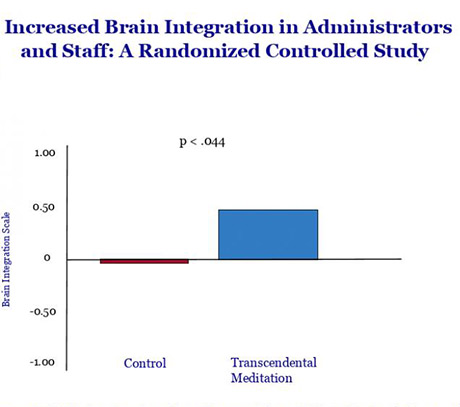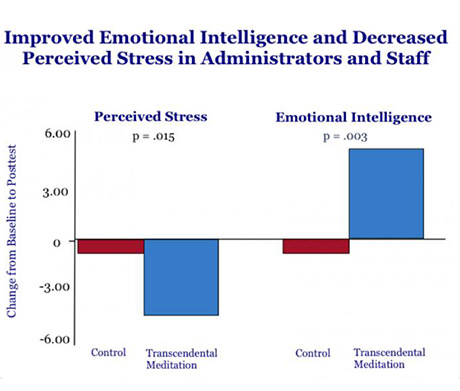Less “compassion fatigue.” Greater resilience. Reduced perceived stress. Increased emotional intelligence (EQ). These are just some of the remarkable results of three new studies on the Transcendental Meditation® (TM®) technique in the workplace.
Professionals from the fields of nursing and education participated in separate studies in which they learned and practiced the TM technique for four months. The studies found that TM practice positively impacted their careers, based both on objective measurements and the subjects own feedback.
1. Reduced Compassion Fatigue for Nurses

Nurses in the Sarasota Memorial Health Care System practicing the Transcendental Meditation technique
Four months of practicing TM helped to reduce “compassion fatigue” and burnout in a group of 27 nurses, while also improving resilience, according to a study published in the Journal for Nurses in Professional Development (Mar/Apr 2019, Vol. 35, Issue 2).
“Working with people who are suffering trauma eventually takes a toll and produces what’s come to be called ‘compassion fatigue,’ ” said lead author Jennifer Bonamer, Ph.D., R.N.-B.C., A.H.N.-B.C., Nursing Professional Development Specialist at Sarasota Memorial Health Care System in Florida. “For years I watched nurses struggle to care for their patients and themselves.”
Dr. Bonamer decided to put the TM technique to the test after searching the scientific literature on self-care. Most of the 27 subjects in the study were Registered Nurses (RNs) working directly with patients.
Four months of practicing TM helped to reduce “compassion fatigue” and burnout in a group of 27 nurses, while also improving resilience.
2. Increased Resilience and Enjoyment among Healthcare Professionals
The researchers used the Professional Quality of Life Scale, which includes a 30-item survey measuring compassion satisfaction and burnout. After four months of TM practice, the nurses experienced a 9.2 percent increase in compassion satisfaction and an 18 percent reduction in burnout.

After four months of TM practice, 27 nurses experienced an 18% reduction in burnout (“compassion fatigue”), a 16.9% increase in resilience, and a 9.2% increase in compassion satisfaction.
Resilience was measured with the Connor-Davidson Resilience Scale, a 25-item survey that reflects resilient perspectives. Again, the nurses experienced positive results—a 16.9 percent increase in resilience.
“These surveys are widely used with demonstrated validity and reliability,” Dr. Bonamer said. “They demonstrated quantitatively what the nurses reported: They felt better and enjoyed their work more.”
The study also highlights the importance of self-care for professional development and longevity in nursing. A 2014 report in Policy, Politics, and Nursing Practice showed that an estimated 17.5 percent of newly licensed RNs leave within the first year and 33.5 percent leave within the second year.

There is an increasing trend toward appreciating the necessity of helping nurses in their careers by taking active steps to use self-care techniques to build resilience.
“We need to invest in our nursing staff and ensure that they have rewarding careers while also providing the best possible care for their patients,” Dr. Bonamer said. “The Transcendental Meditation technique is one step that we could take. A variety of studies have shown its effectiveness in reducing stress and promoting health and well-being.”
“We need to invest in our nursing staff and ensure that they have rewarding careers while also providing the best possible care for their patients.” —Dr. Jennifer Bonamer
3. Enhanced Performance with Greater Peace and Balance for Nurses
Another study published in 2018 in the International Journal for Human Caring reported the experience of RNs in graduate school who practiced the TM technique for four months. The students kept a journal, and the researchers then used American psychologist Amadeo Giorgi’s descriptive phenomenological method to evaluate their content.
The results showed that graduate students who practiced TM were more present and balanced, and experienced enhanced job performance. They also enjoyed greater feelings of bliss, peace, and integrity.
Graduate students who practiced TM were more present and balanced, and also enjoyed greater feelings of bliss, peace, and integrity.
4. Greater Brain Integration and Reduced Distress for Educators
People working in educational settings who practice the TM technique have also shown significant improvements in brain functioning and reduced psychological distress in a study published in Brain and Cognition (August 2018, Vol. 125, pages 100-105).
At the San Francisco Unified School District, 96 central office staff participated in the largest randomized control trial to investigate the impact of TM practice on brain functioning over a four-month period. The study was conducted by the Center for Wellness and Achievement in Education (CWAE).

TM participants showed a significant increase on the Brain Integration Scale, as compared to controls (Center for Wellness and Achievement in Education).
The findings are consistent with past research showing a reduced response to stress factors and more integrated brain functioning resulting from TM practice, according to the lead author of the study, Dr. Fred Travis. This and previous studies suggest that the TM technique affects perceptual processing and thereby supports one’s ability to deal with challenges.
To measure the level of connectivity between brain areas, researchers used the Profile of Mood States (POMS) and the Brain Integration Scale (BIS).
After four months, TM participants showed a significant decrease in Total Mood Disturbance and in the subscales for anxiety, anger, depression, fatigue, and confusion. They also showed a significant increase in vigor. The 79 TM participants in an EEG-subgroup also significantly increased their brain integration scores.
TM participants showed a significant decrease in anxiety, anger, depression, fatigue, and confusion.
5. Improving Psychological Health for Better Leadership
“Management performance and organizational effectiveness are directly compromised by psychological distress and lack of healthy brain functioning,” said Laurent Valosek, coauthor of the study and executive director of the CWAE.
“This research indicates that the TM technique can be used as a tool for improving psychological health and brain integration, important foundational factors that contribute to leadership competency,” he added.
According to Valosek, this study and past research support the idea that the experience of transcending during TM practice systematically transforms inner experience and brain functioning, leading to increased resilience in facing challenges and overcoming them.
The experience of transcending during TM practice systematically transforms inner experience and brain functioning, leading to increased resilience in facing challenges and overcoming them.
6. Reduced Perceived Stress and Greater Emotional Intelligence in School Administrators
In a related study, the 96 central office staff at the San Francisco Unified School District were also shown to experience reduced perceived stress and increased emotional intelligence (EQ), after four months’ practice of the TM technique, as compared with controls.

The TM group had reduced perceived stress and increased emotional intelligence, as compared with controls (Center for Wellness and Achievement in Education).
“Workers, especially in our school districts, are under a growing amount of stress and are asked every day to find solutions to increasingly complex problems,” said Valosek, who was the lead author of the research, published in The Permanente Journal (October 29, 2018, vol. 22).
“This study demonstrates the benefits of Transcendental Meditation in the workplace. And with a growing body of research on the value of emotional intelligence and the harmful effects of psychological stress, organizations are looking to give their employees tools for reducing stress and developing EQ competencies like centeredness, self-awareness, and empathy,” Valosek explained.
This research was coauthored by Maharishi University of Management (MUM) professors Maxwell Rainforth, Ph.D., and Sandford Nidich, Ph.D., and associates. They administered the BarOn Emotional Quotient Inventory and the Perceived Stress Scale to participants before learning the TM technique and again after four months of practice.
The researchers found that those practicing TM not only experienced improvements in total EQ and perceived stress; they also improved in five of the six EQ composite scales:
1. general mood
2. stress management
3. adaptability
4. intrapersonal awareness
5. reality testing
Researchers also observed what they call a “dose response.” They reported: “Regularity in TM practice was defined as home practice of the TM technique of at least once a day, on average.” Compliance was high, “with 93 percent of participants meeting the criteria for study practice regularity. A dose response was observed, with those meditating more regularly scoring lower on perceived stress (r = –0.33, p = 0.032) and higher on total EQ (r = 0.28, p = 0.067) at posttest.”
“A dose response was observed, with those meditating more regularly scoring lower on perceived stress… and higher on total EQ.”
—Laurent Valosek and coauthors
7. Healthy Brain Functioning for Increased Performance and Well-Being
These findings are consistent with past research on the TM technique showing reduced psychological distress and benefits for emotional intelligence, noted Valosek and the coauthors. This study extends prior research by demonstrating the beneficial effects of practicing TM as part of a wellness program in the workplace.
Psychological stress adversely affects organizational commitment, work engagement, and productivity, and contributes to poor mental and physical health. This adds up to a significant loss of value for any organization. Conversely, healthy brain functioning is associated with increased performance and enhanced well-being.
This study extends prior research by demonstrating the beneficial effects of practicing TM as part of a wellness program in the workplace.
The Importance of Emotional Intelligence in All Professions
Recent research highlights the importance of emotional intelligence as a predictor of important work-related factors such as stress management, job performance, negotiation, leadership, emotional labor (the management of feelings and expressions to fulfill the emotional requirements of work), trust, and work-family conflict.
The published results discussed here were found for subjects using the Transcendental Meditation technique in the fields of nursing and education, but they have implications for any organization or profession that’s interested in improving the mental health, emotional competency, and resilience of its employees.
These findings are consistent with past research on the TM technique showing reduced psychological distress and benefits for emotional intelligence.


Comments
You May Also Like
TM in the News
Business Insider: Why Wall Street Loves Transcendental Meditation
The TM technique, which Bridgewater hedge-fund founder Ray Dalio calls "the single biggest influence" on his life, is taking over Wall Street. Here's an in-depth report on why nearly 1,400 finance professionals have learned to meditate at the David Lynch Foundation TM Center.
Business Success
A Business to Satisfy the Soul
"The first time I sat down and meditated, I felt a sense of peace and happiness and contentment like I’d never experienced before in my life." —Jason Gunn, founder of Oliver's Real Food
Business Success
Former Sony Exec Talks about TM and the Art of Developing Emotional Intelligence
Insights from the former president of Sony Pictures Home Entertainment, David Bishop: "The evidence is mounting that for anyone who is, or aspires to be, a leader, Transcendental Meditation® (TM®) can be a vital component in maximizing one’s effectiveness. In my own career, my TM practice proved to be invaluable."
Helping Others
State’s Attorney Brings TM to New England Courthouse and Beyond
Prosecutors, defense attorneys, social workers, court advocates, and police officers regularly practice the Transcendental Meditation® (TM®) technique together in this historic courthouse, thanks to the encouragement of a gregarious lawyer looking out for the well-being of others.